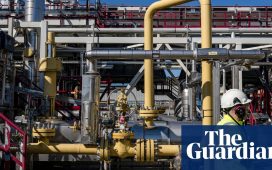North Sea oil and gas companies are failing to switch their investments to renewable energy, research has shown.
Three-quarters of the offshore oil and gas companies operating in the UK plan to invest solely in continued fossil fuel production between now and the end of the decade, according to data compiled by the analyst company Rystad.
Only seven out of 87 companies will spend anything at all on renewable energy projects in the UK before then, despite claims from the industry that they need to be allowed to keep extracting fossil fuels in order to provide funding for their switch to clean energy.
Of those seven, only two plan to ensure that a majority of their investment portfolios will be in renewables by 2030, according to analysis of the data carried out by the campaigning organisation Uplift.
The Labour government has banned new licensing of oil and gas fields in the North Sea, though existing fields will be allowed to continue to operate, and no licences now in the pipeline will be revoked, so several potential fields that are in the early stages of licensing could still go ahead.
Keir Starmer, the prime minister, announced plans for the new nationally owned Great British Energy company, which will boost renewable projects in the UK, to be headquartered in Aberdeen, the home of the North Sea oil and gas industry, to emphasise the government’s commitment to a “just transition” to clean energy, which would ensure that new jobs are created as old ones in fossil fuels decline.
Labour’s ban on North Sea licences has been fiercely resisted by the industry, and was the subject of virulent attacks by the Conservatives during the general election campaign. Separate research by Carbon Brief has shown that the ban will only slightly accelerate the decline of the North Sea, as most of the fields are severely depleted already.
Campaigners said that the new data, seen by the Guardian, showed that oil and gas companies had little intention of changing their business models.
Tessa Khan, the executive director of Uplift, said: “The oil and gas industry is clearly failing to deliver on its promises. The overwhelming majority of North Sea operators have no intention of investing in clean energy and are solely interested in profiting from oil and gas for as long as the North Sea’s dwindling resources allow.”
She warned that the failure by oil and gas companies to invest in a transition to clean energy would not only hold back the UK’s efforts to reach net zero greenhouse gas emissions by 2050, but would hamper the ability of oil and gas workers to find new jobs.
“This pretence [of investing in renewables] is leading to real-world consequences for supply-chain firms, oil and gas workers, and the communities they support,” she said. “Over the past decade, as the basin has declined, the number of jobs supported by the industry has more than halved, and opportunities from the transition for supply chain companies have failed to materialise.”
She called on Labour to resist calls from the industry for favourable treatment, and focus its efforts for a just transition on genuinely greener companies. “This is an industry clearly on a very different path to the one it advertises. [Labour must] come up with a genuine transition plan that has the needs of supply-chain businesses, workers and their communities at its heart.”
A Department for Energy Security and Net Zero spokesperson said: “We are engaging with industry, workers and trade unions to provide certainty through a phased and responsible transition in the North Sea.
“In addition, our national wealth fund, backed by over £7bn, will work with industry to make the UK a world-leader in green technologies, bringing jobs and investment across the country.”
Michael Tholen, policy and sustainability director of Offshore Energies UK, the trade body representing the North Sea oil and gas industry, said: “This research takes a narrow snapshot and misses the bigger picture. Companies operating in the North Sea are actively engaged in delivery of the energy transition as well as seeking to meet the energy needs of the UK today. These projects include investing in all the major carbon storage hubs across the UK helping to decarbonise heavy industry and support the drive to clean electricity, investing in Scotwind and the Innovation and Targeted Oil and Gas wind round [intended to spur the development of wind to power fossil fuel operations] which will unlock floating projects and develop a new hydrogen market.
“These investments are on the go now and will take time to come into operation. Taxing existing oil and gas operations yet harder over the next five years with the proposed intensified windfall tax diverts capital that could be better invested to accelerate the transition.”









